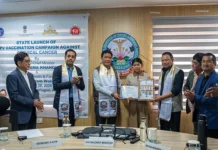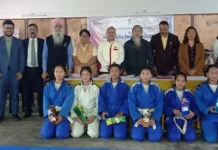[ Abo Monwangham ]
Longding district, nestled in the easternmost part of Arunachal Pradesh, has recently witnessed a troubling rise in cases registered under the Protection of Children from Sexual Offences (POCSO) Act. While the law exists to protect minors from sexual exploitation, the growing number of such cases has cast a shadow over the social and cultural dynamics of the region. This rise, many argue, is not merely a legal concern but a deeper social issue rooted in cultural transitions, parental neglect, and lack of awareness.
From custom to conflict: The Wancho cultural context
Traditionally, the Wancho society did not impose rigid restrictions on premarital relationships. In the absence of f-ormal judicial systems in the past, community mechanisms governed social conduct. While elders maintained a sense of inf-ormal discipline, expressions of love and relationship among youths were not heavily stigmatized. However, with the enforcement of laws like the POCSO Act and the modern judicial framework, such cultural practices now stand in sharp contrast with national legal standards.
This has resulted in a unique clash, where cultural leniency meets statutory rigidity. Many POCSO cases, it is observed, arise not necessarily from malicious intent, but from ignorance – both of the law and its implications.
Often, if a relationship goes smoothly, no one raises a voice. But when a relationship turns sour – especially if the girl’s parents get involved, or if the girl herself lodges a complaint after a breakup – legal action follows. The boy, even if of similar age or just slightly older, is booked under the POCSOAct, sometimes without understanding the magnitude of the accusation.
The silent enablers: Factors behind the surge
Several concerning trends have been attributed to the spike in such cases:
- Lack of Awareness amongst parents
Many parents remain unaware of both the legal frameworks and the behavioural patterns of their children. Open conversations on relationships, consent, and consequences are rarely held. As a result, children grow up navigating emotionally complex situations on their own, often making uninf-ormed choices.
- Early access to mobile phones
With mobile phones being handed over to teenagers – often without supervision or control – access to social media, adult content, and private communication has become unchecked. These tools, while useful, become dangerous in the absence of parental guidance, leading to risky interactions and secret relationships.
- Neglect in monitoring children, especially daughters
In some families, especially those in remote villages, parents fail to check on their children regularly. Girls, in particular, are left to live away from home – in rented houses, hostel-like arrangements, or with distant relatives – in the name of education. Some parents do not even call or visit for weeks, leaving young girls emotionally and physically vulnerable.
- Girls employed as domestic helps
Another troubling trend is that of sending girls to live as domestic helps in towns or cities, hoping for better exposure or financial relief. These children are often out of the protective purview of parents and are susceptible to exploitation, abuse, or manipulation – sometimes without anyone realizing until it’s too late.
- Living alone in rented accommodations
While education is a noble goal, it is becoming increasingly common for teenage girls to be placed in rented accommodations in towns like Longding, without guardians or relatives to watch over them. Left alone, they often fall into peer influence and misguided relationships, which may lead to legal complications.
A collective responsibility
The rising number of POCSO cases is not just a failure of individual families – it reflects a systemic issue that demands immediate attention. Cultural understanding must evolve in tandem with legal literacy. Communities, schools, religious leaders, and village elders must play a proactive role in spreading awareness, guiding youth, and counselling parents.
Workshops and sensitization programmes must be conducted at the grassroots level to educate both boys and girls about the boundaries of law, age of consent, and the irreversible consequences of a POCSO charge.
Above all, parents must take responsibility – to talk to their children, guide them, monitor their lives without policing, and offer emotional security.
Conclusion
Longding, like many tribal regions in India, stands at the crossroads of tradition and modernity. The solution is not to criminalize young love, but to build a society where relationships are based on inf-ormed choices, mutual respect, and legal awareness. If the community doesn’t act now, we risk losing more of our youths – not to crime, but to a lack of care, conversation, and cultural introspection. (The contributor is f-ormer assistant DIPRO, Longding)




